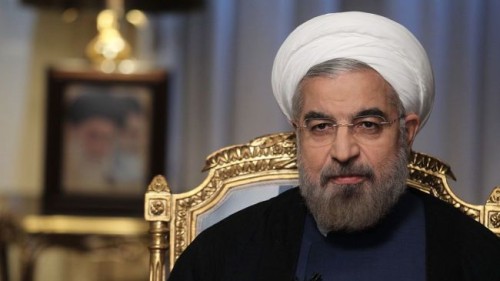LATEST: Rouhani Denies Iran Troops in Iraq
SATURDAY FEATURE
Tehran’s Latest Nuclear PR Offensive
UPDATE 2000 GMT: A local source in Khanaqin said Iranian troops “were deployed a few days ago” in the area: “The Iranian forces came from Naft Khana border point and are ready to fight.”
The source said about 500 soldiers, with small arms and medium weapons, are based in the Kubra Army Base, formerly used by Iraqi forces.
An Iranian Kurdish official, Muhammad Nazifi Qadiri, claimed, “The Iranian army will help those Iraqi political functions that protect Iranian interest in the country, they are not coming for the sake of Iraqi’s interests.”
He said the forces come from Kermanshah in western Iran.
UPDATE 1100 GMT: A “senior Iraqi official” has said that Iran has sent 2,000 Basij militia to Iraq.
The official said 1,500 Basij crossed the border into Khanaqin in Diyala Province in east-central Iraq on Friday, while another 500 had entered the Badra Jassan area in Wasat Province overnight.
The militia are in addition to two battalions of the elite Qods Force who reportedly went to Iraq earlier in the week to bolster the defense of areas near Baghdad and to protect the holy cities of Najaf and Karbala.
A well-placed EA source says some of the Iranians have joined the forces of the Islamic Supreme Council of Iraq, led by Ammar al-Hakim.
(Cross-posted from Iraq Daily)
President Hassan Rouhani has denied reports that Iranian troops are inside Iraq.
“The issue of Iranian forces’ engagement [in Iraq] has not been raised so far,” Rouhani said in a Saturday press conference in Tehran.
Iranian sources have indicated that two battalions of the Qods Force, the elite branch of the Islamic Revolutionary Guards Corps, have been deployed in and near Baghdad. Other sources said about 500 troops were involved, as Qods Force commander Qassem Soleimani reviewed defense lines near the capital and met Iraqi officials.
Iraqi Foreign Minister Hoshyar Zebari pointed towards the assistance in an interview on Friday, “(Iran) offered to help in any way we want, even to send forces.”
Rouhani said Iran would only provide consultation and would not engage in military operations: “If Iraq wants any help from us, we will study it. There has been no request from us so far. We are prepared to provide any assistance but within the framework of international law and based on the Iraqi people’s demands.”
The President also dismissed reports — again from Iranian sources — that Tehran was open to cooperation with the US, “The Americans may also want to help, but I haven’t received any word on that so far.”
He warned Iraqi insurgents not to approach the Iran-Iraq frontier: “If any terrorist group wants to get close to our borders and we feel the threat, we will definitely respond with every possible means.”
An Iranian general said on Friday that insurgents within 100 km (62 miles) of the border might be bombed.
“US Is Behind the Islamic State of Iraq & Its Terrorism”
Even as a “senior Iranian official” told Reuters that Iran is considering cooperation with the US to check the insurgent advance in Iraq, Speaker of Parliament Ali Larijani was putting out a far different message on Friday.
Larijani told a conference in Tehran that the US was responsible for the Islamic State of Iraq and as-Sham, which has led the insurgency:
It is evident that the Americans have committed these acts and the countries around us which do not even have a decent parliament (possibly a reference to Saudi Arabia) have become concerned about democracy in Iraq and Syria.
“This shows that the issue of terrorism has become a propaganda tool for the big powers.
It is unclear why Larijani launched his attack, given that the senior official had said, “We can work with Americans to end the insurgency in the Middle East. We are very influential in Iraq, Syria, and many other countries.”
Iran has come under some pressure in international media with the claim that two battalions of the Qods Force — the elite branch of the Islamic Revolutionary Guards Corps — have entered Iraq. Some reports say they are assisting Iraqi forces and Shia Forces north of Baghdad; others say they are protecting the holy cities of Najaf and Karabala.
Qods Forces commander Qassem Suleimani has reportedly been moving around the battlefront north of Baghdad, reviewing defensive positions, and meeting Iraqi officials in the capital.
In another sign of Iran’s tough stance — and concern — about the Iraqi insurgency and ISIS, Deputy Intelligence Minister Ali Khazei said 30 “agents” of ISIS had been detained across the Islamic Republic in the past month: “The Intelligence Ministry carries out very good and effective measures to counter elements (seeking) to undermine security in the country.”

